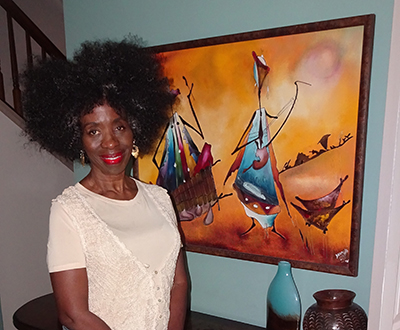Editor’s note: This past January, ASA surveyed its members about what it takes to be a leader in the field of aging, what members would like to learn about how to develop leadership knowledge, skills and abilities, and who best personifies leadership. ASA members identified respected leaders in aging—many of whom are well known to the ASA community and to the field at large. This following Q&A with Elizabeth White is one in a series of leadership profiles we will feature on ASA’s Generations Now Blog in the coming months.

Elizabeth White is a writer, thought leader and aging solutions advocate for older adults facing uncertain work and financial insecurity. She served as Special Advisor to the Executive Director of Senior Service America (SSA) and prior to SSA was Chief Operating Officer of a midsize nonprofit focused on improving economic conditions in Africa.
She has an MBA from Harvard Business School and a Master’s in International Studies from Johns Hopkins University. In 2018, after unexpectedly finding herself out of a job, she wrote the book “55, Underemployed, and Faking Normal,” which emanated from an online essay of the same theme that garnered 11,000 likes and 1,000 comments within days of publishing.
White writes essays and appears on panels discussing how her job loss in the Great Recession holds bountiful lessons for older adults going through similar situations during the pandemic. In a TED talk in August (forthcoming), White addresses race and her reaction as an older black woman to the post-George Floyd protests. Weekly she hosts a drop-in Zoom gathering of older adults with her friend, Marc Blesoff [a facilitator at Wise Aging and Conscious Aging workshops], which covers aging, race, ableism and allyship. White lives in Washington, DC, with her daughter and grandson.
ASA: How might you describe the way leadership in the field of aging differs from leadership in other fields?
EW: In the aging field the need for urgency is greater. What I’d like to see from leaders in aging is more urgency in terms of the often short-term dire needs of economically vulnerable adults. A friend and I were talking about the $600 monthly pandemic unemployment relief and her view was that money was the wrong way to approach the issue, and that we should instead raise the national minimum wage to $15 dollars an hour. That’s a laudable long-term goal, but people are going over the cliff when the money runs out at the end of July. It’s a luxury sometimes to focus on the long-term when short-term needs are immediate and pressing.
ASA: How did you use networking to progress in the field of aging?
EW: I reach out to people to connect. Once I read an article written by Marc Blesoff, who was working in the prison system with older men. Despite the fact that some of these men would never get out of prison they were reflecting on their lives and what they could do for their remaining years. I wondered, what kind of person would do that sort of work, focused on this population? I reached out to him, and we have become dear friends, I’ve met his family, and we’ve done all kinds of projects together.
Another time I had read an article on the future of work, and the writer couldn’t meet me, but they recommended someone in DC, so I went to talk with them, and they told me to talk to Tony Sarmiento [former ASA board member and Executive Director of Senior Service America]. I called him, he was running something called Senior Service America, and our first meeting lasted 2½ hours. He is well known in the aging field and was so helpful. He introduced me to everyone. If I had given up after the first person said they were the wrong person, I would have never gotten to Tony. If I had not been curious about the article about older adults in the prison system, I would never have met Marc.
ASA: What sort of education did you find most helpful?
EW: Becoming an entrepreneur after working at the World Bank. When you work at an institution like the World Bank, you get affirmation. It’s an elite organization, a multilateral organization, and is very hard for Americans to get into, plus there are almost no African Americans there at all. From that setting to owning your own business is jarring as no one’s heard of the business or of you. It’s a humbling experience.
I was in retail, selling widgets, and I was doing everything, mopping the floor, meeting with landlords, vendors, customers, accountants—from soup to nuts. Whereas in a big organization, they do all of that administrative stuff—payroll, HR—at the World Bank they did everything. It’s a huge difference. You’re learning a lot about what is involved in running a business with no massive supportive structure. I had been advising small businesses, and I realized when I ran one just how much there was to learn.
ASA: What do you think is the most critical skill to have as a leader?
EW: One is to listen to junior staff so the information you have is not just from the senior leadership team. Institute some structured way in which to hear what matters, what’s important, to people who are earlier on in their careers.
It’s important when you are outward facing and making decisions to think about who should be in the room and who is not currently in the room. Think about that as you are making decisions, who will be advantaged and who will be disadvantaged by any decision you might make?
It’s also important not to micro manage people, to assemble the smartest people you can and give them room to do their work. And it’s important to make sure they are compensated properly, and that there is transparency around compensation.
ASA: Can you speak to one leadership challenge encountered on the job and how you met it?
EW: Once I had a boss who wanted to promote a man over two very competent women. I was running a department where we had to raise a lot of money, and one of the women raised 60 percent of money for the department. The man raised less than 10 percent, but he was a good friend of the person running the organization. I was being asked to promote this guy over two very high performing women and change the title of one of the women to a title she wasn’t going to like.
Sometimes you’re in a situation where you can’t win everything. I called in the two women separately to explain what was happening. I could assure them that I could block the guy from being their manager, but I couldn’t block the title changes and other things that were part of the decision. It cost me a lot of political capital to take that position.
You have to decide which hill you’ll die on. I was not happy with any part of the decision, but had to make peace with it. The optics were terrible for younger women, as it was public who was bringing in the most money and meeting metrics. It was all turned upside down, and hard to justify.
ASA: What might you say to inspire younger potential leaders in the aging sector?
EW: We are at a point of momentous change. Never before will so many live to be so old. And not only will we live to be so old, but lots of people will have at least one chronic condition. True, we are aging in better health than we used to, but with smaller nest eggs. There really are no role models, no roadmap for how to do this, especially when we know that 40 percent of retirees and near retirees are going to be living in poverty or near poverty conditions.
There’s an opportunity to think about how people can live richly textured lives on moderate incomes. People will be living longer on less. I think there’s this place where the sustainability movement and the aging phenomenon intersect. The sustainability movement is asking us to be more intentional and thoughtful about consumption at a time when many older adults will not be able to afford or maintain the standard of living of their younger years. I don’t just mean people who have been struggling all their lives and are having a rough go of it in old age. I’m talking about middle-class Americans who will be looking at downward mobility for the first time. We need investment in how to ensure those millions of people have a chance at a decent life.
In terms of new thinking required, innovative ideas, new systems—this is the future. For a younger person coming into this field it could be an exciting and inspiring time to do this work.













